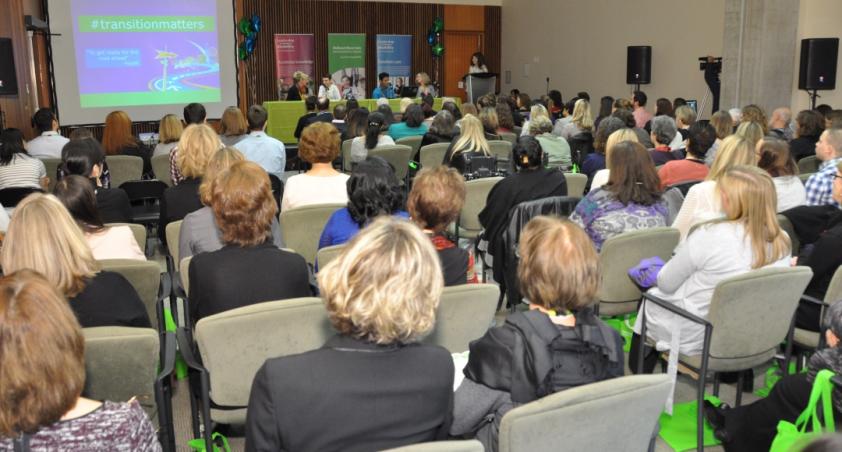With a focus on Transitions, the event brought together researchers, clinicians, scientists, government, students, and clients and families to explore new research from the BRI. You can see highlights on Twitter by searching the hashtag #TransitionMatters!
Hosted by the Bloorview Research Institute, and led by co-hosts Suzanne Jorisch, family leader, and Tom Chau, vice-president of research, the event was our largest symposium ever.
Symposium Overview
Transitions matter for many reasons, not only because they affect people across each stage of their life, but also because they provoke new territory to explore. What transition services, supports and models are effective, and why? Which children or youth stand to benefit the most? What defines a successful transition? These questions and more were explored at this year's Symposium, with the largest number of attendees ever.
Research talks, using a TEDtalk style, were innovative and engaged people in the following transition talks:
- Gathering evidence to support families in transition to development/rehabilitation services for children with neurodevelopmental disorders: Understanding parents' experiences and needs
- Presenters: Marilyn Ballantyne and Cheryl Peters, Family Leader
- Evidence-informed perspectives on hospital-to-school transitions from students, families, educators, clinicians and researchers
- Presenter: Laura Hartman
- Optimizing life success through residential immersive life skills programs for youth with disabilities
- Presenters: Bob McKay, Kimberlea Jones-Galley, and Alanna Rudzik
- Project Falcon: Exploring a virtual reality-based video game controller with haptic feedback for upper extremity rehabilitation of young people with cerebral palsy
- Presenter: Hamilton Hernandez
Thought-provoking and insightful dialogue emerged out of the Lived Experience Panel. Quick hits took research in the fast lane. An opening performance and dance of possibilities captured the heart of everyone in the room. The poster session brought together diverse audiences and informed new perspectives. Co-hosts Tom Chau and Suzanne Jorisch, Family Leader, led the exciting day.
The BRI was joined by Debra Stewart, the event keynote and Mickey Milner International Professorship Lecture. Debra presented recent research and relevant theories and models that contribute to evolving 'evidence-based practices' to support and engage children and youth with disabilities, their families, and their communities, during life course transitions.
November 10th raised the volume on transition research, with many thanks to all speakers and thought-leaders, scientists and families, and the audience.
Mickey Milner International Professorship Lecture
Debra Stewart, MSc. OT Reg. (Ont.)
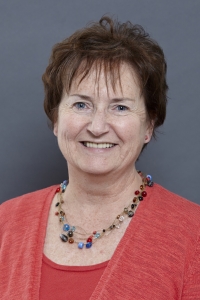
Symposium keynote Debra Stewart, associate professor in the occupational therapy program, School of Rehabilitation Science, and a scientist with CanChild Centre for Childhood Disability Research at McMaster University, presented her recent research and relevant theories and models that contribute to evolving 'evidence-based practices' to support and engage children and youth with disabilities and their families and communities, during life course transitions.
She described key themes that have emerged from her experiences and work over the years that are applicable to all types and stages of transitions. These themes were then considered in relation to the contexts of health care services and community supports and concluded with evidence-based recommendations for clinical practice, family and community engagement, and research.
MORE - Read our interview with Debra Stewart on what drives her and her thoughts on what transitions really means
Research TEDTalks
Symposium speakers delivered presentations in TEDTalk style to ensure that content was engaging and accessible for everyone.
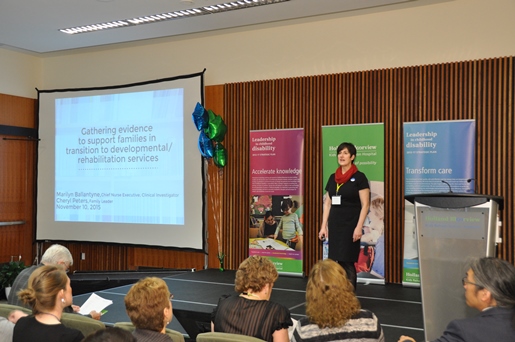
Gathering evidence to support families in transition to development/rehabilitation services for children with neurodevelopmental disorders: Understanding parents' experiences and needs
Presenters: Marilyn Ballantyne and Cheryl Peters, Family Leader
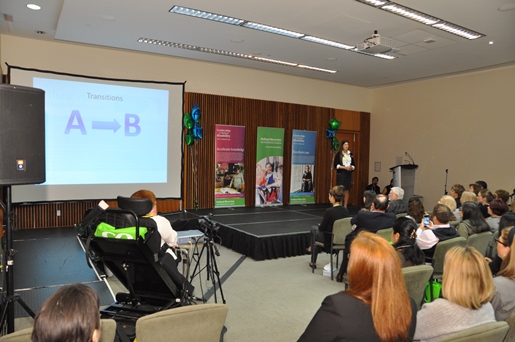
Evidence-informed perspectives on hospital-to-school transitions from students, families, educators, clinicians and researchers
Presenter: Laura Hartman
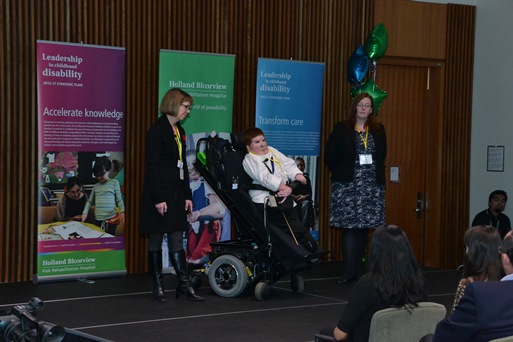
Optimizing life success through residential immersive life skills programs for youth with disabilities
Presenters: Bob McKay, Kimberlea Jones-Galley, and Alanna Rudzik
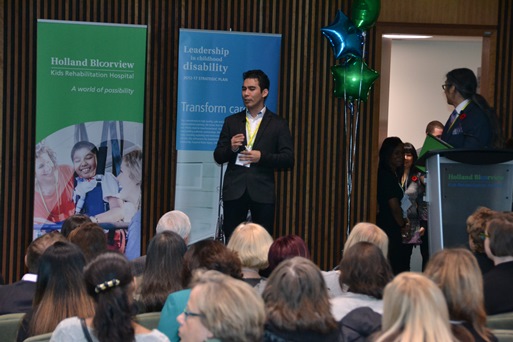
Project Falcon: Exploring a virtual reality-based video game controller with haptic feedback for upper extremity rehabilitation of young people with cerebral palsy
Presenter: Hamilton Hernandez
Notable Awards
Whittaker Award
To commemorate Dr. John Whittaker’s dedication to improving the quality of life of children with cerebral palsy and other developmental disabilities, his family and friends have established an annual award. The John Whittaker Memorial Award rewards outstanding contributions in research, service, or product development that improve the quality of life of children and youth with cerebral palsy or other developmental disabilities.
This 2015 recipient of the Whittaker Award is: Elaine Widgett, Operations Manager, Rehab and CCC, Brain Injury Rehab Team.
Graduate Student Awards (2015-2016)
Kimel Family Graduate Student Scholarships in Paediatric Rehabilitation ($20,000) winners:
- Patrick Jachyra, Enhancing physical activity for young people with Autism Spectrum Disorder
- Ben Kinsella, An artificially intelligent social coach for children with ASD
Kimel Family Graduate Student Scholarships in Paediatric Disability Research ($20,000) winners:
- Alicia Hilderley, Linking neuroplasticity with the outcomes of motor learning based interventions: A multi-modal evaluation of walking-based training in children and youth with cerebral palsy (CP)
- Filip Stojic, The application of an auditory-tactile brain-computer interface on individuals with severe physical disability and cortical visual impairments
“Whipper” Watson Graduate Research Studentship Award ($10,000) winner is:
- Zahra Emami, Quantifying and overcoming the effects of distractions on cognitive load in brain-computer interfaces (BCIs): Implications for cognitive neuroscience and real-world BCIs
Holland Bloorview Foundation Graduate Student Award ($10,000) winner is:
- Karolina Urban, Measuring brain activity during completion of dual-tasks in pediatric concussion patients
- Brydne Edwards, Promoting social inclusion experiences in recreational environments for children with disabilities
